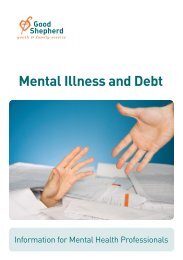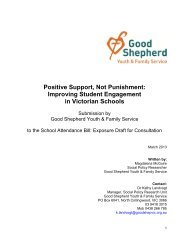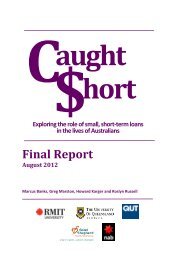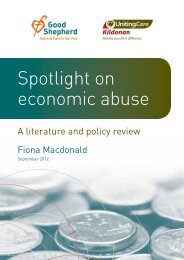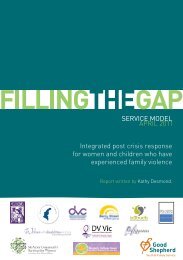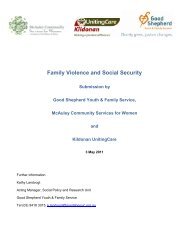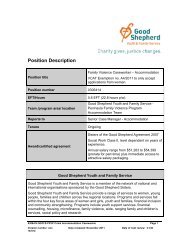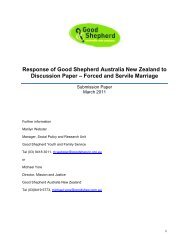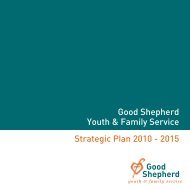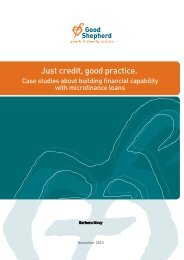Spotlight on economic abuse - Good Shepherd Youth & Family ...
Spotlight on economic abuse - Good Shepherd Youth & Family ...
Spotlight on economic abuse - Good Shepherd Youth & Family ...
Create successful ePaper yourself
Turn your PDF publications into a flip-book with our unique Google optimized e-Paper software.
Community Services Policies and Practices<br />
This secti<strong>on</strong> describes some of the key c<strong>on</strong>necti<strong>on</strong>s between the community services sector<br />
and ec<strong>on</strong>omic <strong>abuse</strong>. Key services and programs relating to ec<strong>on</strong>omic <strong>abuse</strong> are mainly<br />
tertiary interventi<strong>on</strong>s, including some services that are specifically designed to assist<br />
individual women experiencing domestic and family violence as well as more general<br />
services such as financial counselling, legal assistance, accommodati<strong>on</strong> assistance, material<br />
aid and financial educati<strong>on</strong> programs. Service providers in these areas are also active in<br />
developing and providing sec<strong>on</strong>dary interventi<strong>on</strong>s, for example educati<strong>on</strong> and training for<br />
workers and systemic advocacy.<br />
This secti<strong>on</strong> is primarily organised around different sectors of community services providers<br />
and c<strong>on</strong>siders the ways in which they relate to ec<strong>on</strong>omic <strong>abuse</strong>. First, however, it draws<br />
attenti<strong>on</strong> to some recent research findings and to development work by community sector<br />
organisati<strong>on</strong>s c<strong>on</strong>cerning some possible gaps and/or priorities for service resp<strong>on</strong>ses that are<br />
not sector specific or that may require collaborative resp<strong>on</strong>ses.<br />
Recent findings relating to service and program gaps<br />
In Braaf and Barrett Meyering’s (2011) recent study, workers in a variety of community<br />
services (for example, domestic violence, health service, legal service) identified financial<br />
issues as being raised regularly in their discussi<strong>on</strong>s with clients affected by domestic<br />
violence and they observed that financial <strong>abuse</strong> was very comm<strong>on</strong> am<strong>on</strong>g such clients. This<br />
and other studies have also identified the following issues for services:<br />
<br />
<br />
<br />
A need for greater acknowledgement of the l<strong>on</strong>g-term impacts of violence and the<br />
need for post-crisis support aimed at preventing women returning to violent<br />
relati<strong>on</strong>ships and supporting women’s wellbeing in the l<strong>on</strong>ger-term (Desm<strong>on</strong>d 2011;<br />
Evans 2007).<br />
A need for workers supporting women <strong>on</strong> exit from domestic and family violence to<br />
provide individual ‘ec<strong>on</strong>omic advocacy’ around women’s debts, savings, assets and<br />
income as a key strategy to assist women increase their financial security following<br />
domestic violence (Barrett Meyering 2012).<br />
A need for ec<strong>on</strong>omic advocacy at a systemic level, for financial literacy educati<strong>on</strong> as<br />
preventative measures and for specialised financial literacy programs from women<br />
affected by violence (Braaf & Barrett Meyering 2011).<br />
A need for training around domestic violence and linkages with domestic violence<br />
and other services including to raise awareness of the ec<strong>on</strong>omic impacts of domestic<br />
violence <strong>on</strong> women and to recognise that <strong>abuse</strong> may c<strong>on</strong>tinue after separati<strong>on</strong> (Braaf<br />
& Barrett Meyering 2011).<br />
Domestic and family violence services<br />
In the United States c<strong>on</strong>text, Christy-McMullin (2011) maintains that domestic violence<br />
services generally focus <strong>on</strong> mental health, parenting skills and domestic skills and that this<br />
reflects patriarchal society and traditi<strong>on</strong>al gender assignments. She argues that emoti<strong>on</strong>al<br />
<strong>abuse</strong>, ec<strong>on</strong>omic literacy, and wealth and asset building need to be brought to the fore of<br />
service, policy and research practice agendas. This critique does not readily apply to the<br />
52



